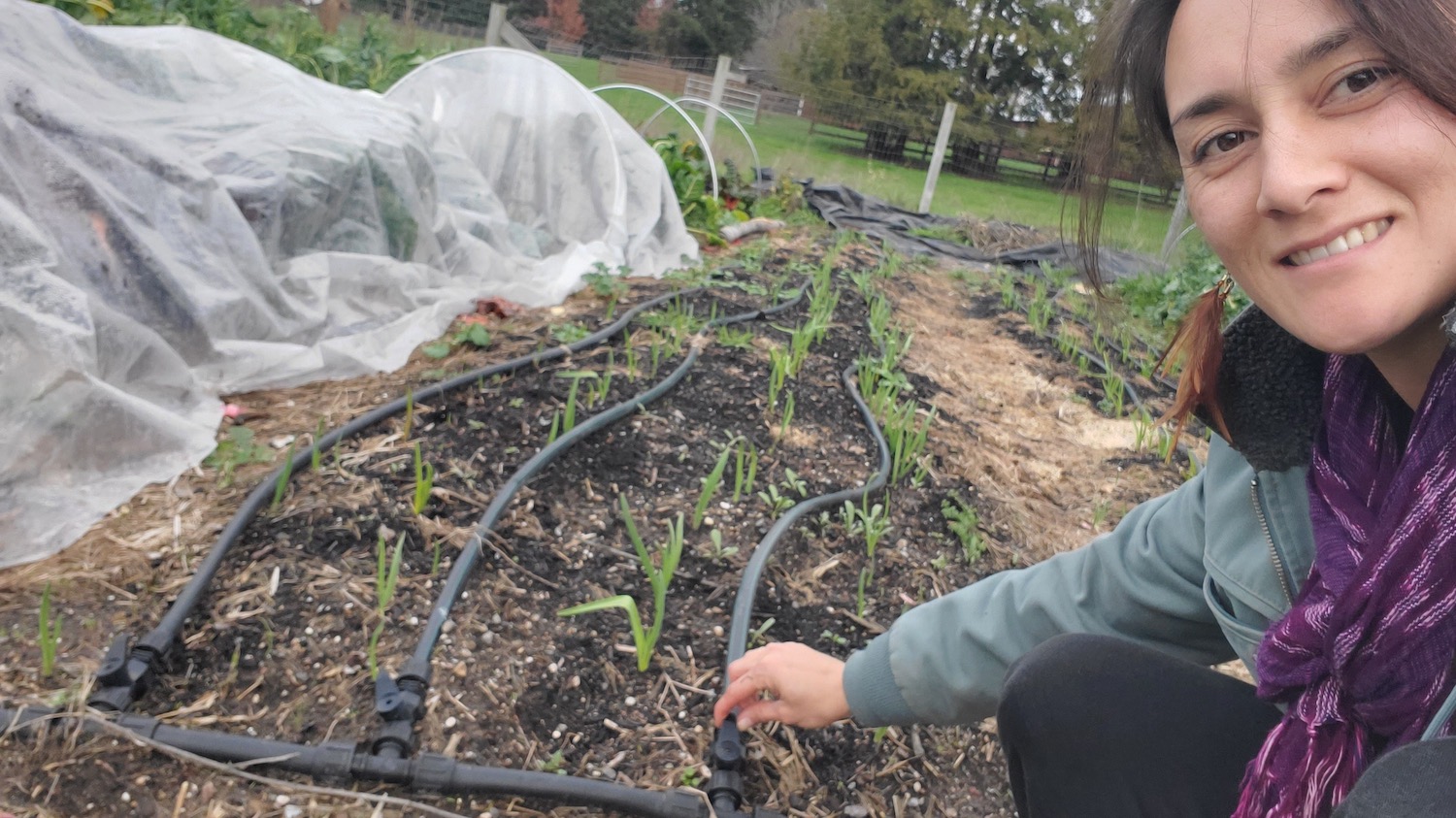
This past spring, The FruitGuys Community Fund selected 17 small farms and agricultural nonprofits from 11 different states to receive a total of $71,136 in grants for farm projects that advance environmental and economic health. The majority of funds were directed to farms owned or led by Black Indigenous People Of Color (BIPOC) women, furthering our goal of providing critical support to under-represented farmers. Generous program sponsorship from Aramark, the Philadelphia-based food and facilities service provider, supported a group of non-profit BIPOC farms this round. We’ve just received final project updates from the grantees. Here’s stories of the successes and challenges they’ve had implementing their projects.
Final Project Updates
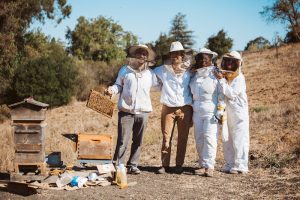 Agroecology Commons is a 1-acre agricultural nonprofit in El Sobrante, CA that grows seasonal vegetables. They received a $4,918 grant to enhance their water conservation practices by installing drip irrigation, adding bee hives for pollination, and building a hoop house to extend their growing season.
Agroecology Commons is a 1-acre agricultural nonprofit in El Sobrante, CA that grows seasonal vegetables. They received a $4,918 grant to enhance their water conservation practices by installing drip irrigation, adding bee hives for pollination, and building a hoop house to extend their growing season.
Agroecology commons installed their drip irrigation system as part of the Farmer-to-Farmer training program. The new system allows them to control and monitor their water usage and will help create incubator farms that “will provide people with explicit access to land in the Bay Area, a rare opportunity, to grow food and medicine, while learning, deepening, and returning to the skills of our ancestors from around the world.” They were also able to add two beehives, increasing the pollinators on their farm, and host a beekeeping workshop with Cameron Redford from the BlackHives Matter project. Unfortunately, they faced setbacks with their hoop house design but were able to shift funding to install some much-needed perimeter deer fencing.
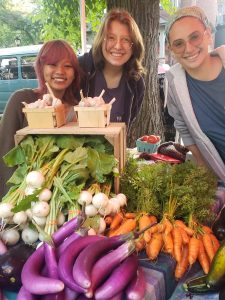 5 Loaves Farm, a 1-acre agricultural nonprofit in Buffalo, NY, provides sustainably-grown fruit, vegetables, honey, and maple syrup to residents and opportunities for local youth, immigrants, and refugees to work and grow food. They received a $4,998 grant to increase their sustainability by improving soil health, replacing sprinklers with drip irrigation, extending their growing season with a new hoop house, installing pollinator plantings, and subsidizing several CSA shares for at-risk youth interns and their families.
5 Loaves Farm, a 1-acre agricultural nonprofit in Buffalo, NY, provides sustainably-grown fruit, vegetables, honey, and maple syrup to residents and opportunities for local youth, immigrants, and refugees to work and grow food. They received a $4,998 grant to increase their sustainability by improving soil health, replacing sprinklers with drip irrigation, extending their growing season with a new hoop house, installing pollinator plantings, and subsidizing several CSA shares for at-risk youth interns and their families.
5 Loaves has been busy! They installed pollinator plantings, berry trellising, silage tarps, and drip irrigation to their existing hoop houses. Farm Director Matt Kauffman told us they’ve “already reduced water that was being used through overhead irrigation.” They have also procured and used compost from a local producer and were able to take on a larger staff and more youth interns! These changes will help them improve soil health, support pollinators, increase yields, and provide their community with culturally appropriate produce.
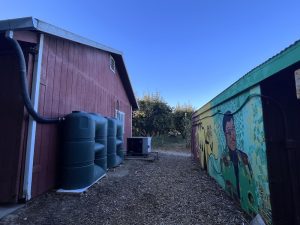 EARTHseed Farm, a certified-organic, solar-powered 14-acre agricultural nonprofit in Sebastopol, CA, grows apples, pears, persimmons, plums, pluots, guavas, mixed berries, herbs, and flowers. They operate and are rooted in AfroIndigenous permaculture principles built on the long legacy of earth wisdom traditions of people of African descent. They received $4,970 to install a rainwater catchment system they expect will provide up to 1,000 gallons of water each year that they will use to irrigate their orchard and become part of educational tours.
EARTHseed Farm, a certified-organic, solar-powered 14-acre agricultural nonprofit in Sebastopol, CA, grows apples, pears, persimmons, plums, pluots, guavas, mixed berries, herbs, and flowers. They operate and are rooted in AfroIndigenous permaculture principles built on the long legacy of earth wisdom traditions of people of African descent. They received $4,970 to install a rainwater catchment system they expect will provide up to 1,000 gallons of water each year that they will use to irrigate their orchard and become part of educational tours.
EARTHseed is thrilled to have successfully installed a 525-gallon rainwater catchment system on their farm store. The system is featured on tours and shared with farm visitors for their U-Pick operation and other programs. Abundance Steward Mallika Nair told us that the project had been a good start towards water conservation on the farm, and they are already looking at expanding the system.
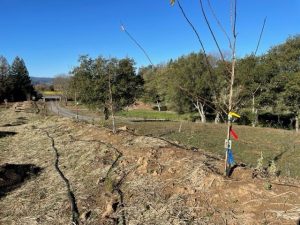 Farm to Fight Hunger, a 2-acre agricultural nonprofit in Healdsburg, CA, donates 100% of everything it grows to fight food insecurity in Sonoma County. They grow culturally-relevant varieties of vegetables, including tomatoes, tomatillos, peppers, squash, corn, onions, broccoli, cauliflower, kale, nopales, and Mexican and South American herbs. Having converted an acre of vineyard to vegetable production, they received a $4,755 grant to plant a 300-foot-long hedgerow of native, drought-tolerant plants, fruit, and nut trees to create a habitat for pollinators and other beneficial insects.
Farm to Fight Hunger, a 2-acre agricultural nonprofit in Healdsburg, CA, donates 100% of everything it grows to fight food insecurity in Sonoma County. They grow culturally-relevant varieties of vegetables, including tomatoes, tomatillos, peppers, squash, corn, onions, broccoli, cauliflower, kale, nopales, and Mexican and South American herbs. Having converted an acre of vineyard to vegetable production, they received a $4,755 grant to plant a 300-foot-long hedgerow of native, drought-tolerant plants, fruit, and nut trees to create a habitat for pollinators and other beneficial insects.
This fall, Farm to Fight Hunger installed their 300-foot-long hedgerow of native, drought-tolerant plants, fruit, and nut trees at the back of a 1-acre vegetable production field. They told us that “in addition to having something in bloom and providing pollen ten months out of the year, the row will also supply fruit for donation into the community to those in need of healthy food.” As the plants get established, they’ll water this row for a few years.
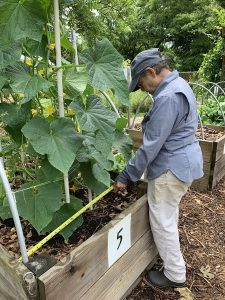 Urban Food Forest at Brown Mill Community Garden is a 1-acre agricultural nonprofit located in a food desert within Atlanta, GA, that grows a variety of greens, fruit, beans, herbs, and flowers for neighborhood residents. They received a $3,581 grant to upgrade their watering system with pre-fabricated irrigation grids for 30 of their 39 raised planting beds to conserve water, conserve soil, and improve productivity.
Urban Food Forest at Brown Mill Community Garden is a 1-acre agricultural nonprofit located in a food desert within Atlanta, GA, that grows a variety of greens, fruit, beans, herbs, and flowers for neighborhood residents. They received a $3,581 grant to upgrade their watering system with pre-fabricated irrigation grids for 30 of their 39 raised planting beds to conserve water, conserve soil, and improve productivity.
Garden Manager Rosemary W. Griffin told us that they’ve successfully installed their new irrigation grids. These grids are ideal for the square-foot gardening method and will help save on labor and increase production. She also said, “The rain sensor added to the programmable system will aid in the conservation of water by keeping the system off when there has been an adequate amount of rainfall.”
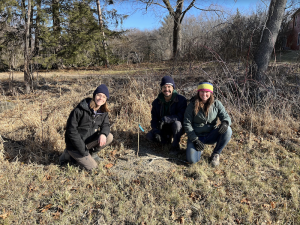 Stonefield Farm of Boston Area Gleaners is a 25-acre agricultural nonprofit in Acton, MA, on land that has been farmed for nearly 100 years. Boston Area Gleaners recently purchased the farm to further its mission to support an equitable, just, and sustainable local food system. They received a $4,931 grant to purchase and plant native hydrophilic trees, including willows and red maples, to absorb excess water in poor drainage areas. In addition, native pollinator plants that thrive in a wet environment will complement the area.
Stonefield Farm of Boston Area Gleaners is a 25-acre agricultural nonprofit in Acton, MA, on land that has been farmed for nearly 100 years. Boston Area Gleaners recently purchased the farm to further its mission to support an equitable, just, and sustainable local food system. They received a $4,931 grant to purchase and plant native hydrophilic trees, including willows and red maples, to absorb excess water in poor drainage areas. In addition, native pollinator plants that thrive in a wet environment will complement the area.
Stonefield Farm was able to do some grading in their wettest field and begin installing their trees and plants and will finish their final seeding in the spring. Senior Advisor Laurie Caldwell told us the project will provide habitat for beneficial birds and insects and “will also increase crop yields in the field by naturally controlling flooding.”
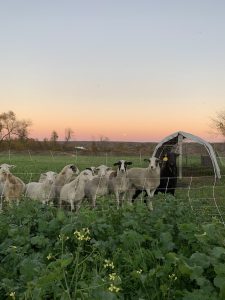 Movement Ground Farm is a 5-acre agricultural nonprofit in Tiverton, RI, that grows a wide variety of vegetables, with a special focus on crops catering to South East Asian and Chinese immigrants and refugees, as well as chickens for eggs and meat. They received a $4,741 grant to add 12 Katahdin lambs to their farm for grazing and meat. Lamb is relevant to many immigrant communities, and their CSA is the only one in Rhode Island with a majority BIPOC membership base.
Movement Ground Farm is a 5-acre agricultural nonprofit in Tiverton, RI, that grows a wide variety of vegetables, with a special focus on crops catering to South East Asian and Chinese immigrants and refugees, as well as chickens for eggs and meat. They received a $4,741 grant to add 12 Katahdin lambs to their farm for grazing and meat. Lamb is relevant to many immigrant communities, and their CSA is the only one in Rhode Island with a majority BIPOC membership base.
Development Coordinator Mimi Budnick told us that their first flock of lambs was successful. Budnick said, “their presence on the land helped to fertilize new fields for future crop production, helped with weed management, and gave us a chance to educate the many people that came to the farm about the benefits of integrating livestock into a farming landscape.” The meat from the lambs was offered in their CSA and helped increase revenue.
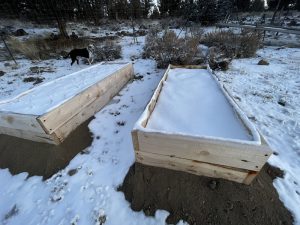 Sakari Farms is a 3-acre tribal food and education farm in Bend, OR. They received a $1,086 grant to build raised growing beds for a demonstration garden to grow Camas, Wapato, and Makah potatoes for harvest and educational purposes. These root-based native and traditional plants are a main food source, seasonal staple, and of high importance to ceremonial events and systems in the region.
Sakari Farms is a 3-acre tribal food and education farm in Bend, OR. They received a $1,086 grant to build raised growing beds for a demonstration garden to grow Camas, Wapato, and Makah potatoes for harvest and educational purposes. These root-based native and traditional plants are a main food source, seasonal staple, and of high importance to ceremonial events and systems in the region.
Despite daunting challenges of severe drought, high temperatures, and labor shortages, build and fill two new planting beds. Sakari’s Owner, Spring Alaska Schreiner, told us, “having 2 well built, raised beds with durable/local milled woods will allow the extension of the ability to maintain healthy traditional crops for our educational programs for future years to come.”
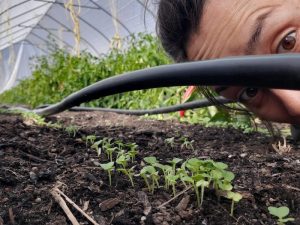 Red H Farm, a 2-acre farm in Sebastopol, CA, is grounded in the agroecological ethics of growing soil, conserving water, fostering biodiversity, cultivating community, and building equity. While the majority of their land is dry-farmed, climate change issues such as California’s ongoing drought, wildfires, and extreme heat have prompted them to expand the portion of the farm using drip irrigation. They received a $5,000 grant to expand their drip irrigation system to support production for their sliding-scale winter CSA program, establish perennial edible and pollinator-focused hedgerows, and a caterpillar tunnel.
Red H Farm, a 2-acre farm in Sebastopol, CA, is grounded in the agroecological ethics of growing soil, conserving water, fostering biodiversity, cultivating community, and building equity. While the majority of their land is dry-farmed, climate change issues such as California’s ongoing drought, wildfires, and extreme heat have prompted them to expand the portion of the farm using drip irrigation. They received a $5,000 grant to expand their drip irrigation system to support production for their sliding-scale winter CSA program, establish perennial edible and pollinator-focused hedgerows, and a caterpillar tunnel.
Red H Farm has already begun seeing benefits from their project. They have been able to install and use their drip irrigation system and caterpillar tunnel, helping to improve yields and extend their growing season. They also have grown or purchased plants, including grapes, berries, and mulberries which they’ll be using to create hedgerows along the deer fencing they installed this year. Owner and Operator Caitlin Hachmyer told us, with winter crops still thriving in the tunnel, “we are running a 38 member CSA this year and have plans to expand to at least 50 next winter.”
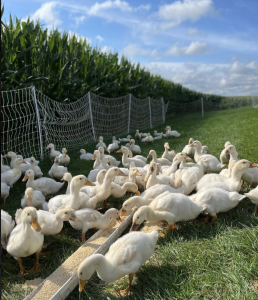 Over the Moon Farm & Flowers, a 4-acre farm in Coggon, IA, run by two young queer women farmers, grows cut flowers and humanely-raised chicken, turkey, pork, beef, and eggs sold through their CSA. They received a $5,000 grant to purchase electric poultry net fencing and the planting of trees, perennial flowers, and shrubs for a windbreak that will double as future habitat for their pasture-based poultry.
Over the Moon Farm & Flowers, a 4-acre farm in Coggon, IA, run by two young queer women farmers, grows cut flowers and humanely-raised chicken, turkey, pork, beef, and eggs sold through their CSA. They received a $5,000 grant to purchase electric poultry net fencing and the planting of trees, perennial flowers, and shrubs for a windbreak that will double as future habitat for their pasture-based poultry.
The poultry net fencing and cover crop seeds already allowed Over the Moon to expand their pastured poultry production. They have also planted their perennials which will provide future shade for the poultry, windbreaks, and protection from chemical drift. Co-Owner Anna Hankins said, “while they have only just begun to grow, we know that their future impact will allow us to have a more sustainable and viable farm business.”
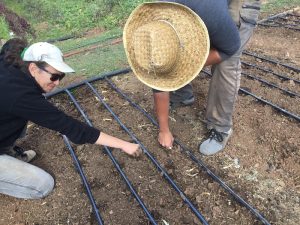 SongHaven Farm, is a 4-acre farm in Cahone, CO, that grows over 30 varieties of vegetables, herbs, flowers, and raises egg-laying chickens and dairy goats. The farm has seen increases in wind pressure over the last ten years, which has made growing more challenging, with soil temperatures staying cooler longer, plants suffering, and regular high tunnel damage. They received a $5,000 grant to build an energy-efficient underground greenhouse called a Walipini. These structures utilize passive solar design principles and upcycle materials for their construction.
SongHaven Farm, is a 4-acre farm in Cahone, CO, that grows over 30 varieties of vegetables, herbs, flowers, and raises egg-laying chickens and dairy goats. The farm has seen increases in wind pressure over the last ten years, which has made growing more challenging, with soil temperatures staying cooler longer, plants suffering, and regular high tunnel damage. They received a $5,000 grant to build an energy-efficient underground greenhouse called a Walipini. These structures utilize passive solar design principles and upcycle materials for their construction.
SongHaven purchased the material and supplies needed for the greenhouse frame. Unfortunately, they’ve faced several challenges this season, including two bouts of Covid. However, Owner and Farmer Michele Martz remains optimistic about installing the greenhouse next season. She told us these setbacks would give them “more time to consider the design of our project and come up with the best place to put the structure.”
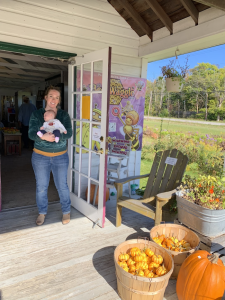 Carlson’s Island View Orchard is a fifth-generation farm in Sister Bay, WI. The first cherry trees were planted in 1915, and the farm offers a popular You-Pick program featuring fruit, strawberries, plums, tomatoes, and pumpkins. They received a $3,359 grant to replace their drip irrigation system, repair their hoop house, purchase strawberry and raspberry plants to diversify their crops, and establish native Mason bee colonies for pollination.
Carlson’s Island View Orchard is a fifth-generation farm in Sister Bay, WI. The first cherry trees were planted in 1915, and the farm offers a popular You-Pick program featuring fruit, strawberries, plums, tomatoes, and pumpkins. They received a $3,359 grant to replace their drip irrigation system, repair their hoop house, purchase strawberry and raspberry plants to diversify their crops, and establish native Mason bee colonies for pollination.
Carlson’s Island View Orchard has had a big year! They have installed drip irrigation, improved their soil with compost and no-till mowing, diversified their crops with spring strawberries and fall raspberries, repaired their greenhouse, and started a pollinator program. Their pollinator program has included educational opportunities, including a game on bee communication at their fall corn maze in which over 300 children participated! On top of all their grant project work, they welcomed a daughter who will be a 6th generation farmer to the Orchard. Owner and Farmer Anna Carlson-Krauel told us that the work they’ve done this summer “will allow us the revenue needed to put back into the farm and continue to grow and expand for future generations.”
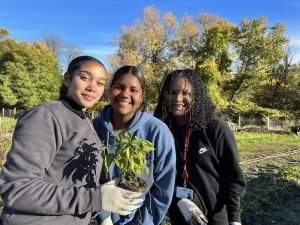 Costello Urban Farm is a 1-acre agricultural nonprofit in Lawrence, MA, that provides a year-round program that offers part-time, paid positions for local high school students to plan, grow, and harvest produce; lead local environmental and healthy community initiatives; and challenge their peers to do community service. The farm’s harvest is donated to local food banks or sent home to the youth’s families. They received a $2,800 grant to repair their broken drip irrigation system.
Costello Urban Farm is a 1-acre agricultural nonprofit in Lawrence, MA, that provides a year-round program that offers part-time, paid positions for local high school students to plan, grow, and harvest produce; lead local environmental and healthy community initiatives; and challenge their peers to do community service. The farm’s harvest is donated to local food banks or sent home to the youth’s families. They received a $2,800 grant to repair their broken drip irrigation system.
Costello Urban Farm was able to upgrade and replace the irrigation timer systems around the farm with battery-powered timers, which will be compatible with a future solar system. They also completed other repairs to the irrigation system and moved irrigation hoses. Development Manager Megan Davis told us that these upgrades have already reduced labor and improved productivity. She said, “at the end of 2022, the total produced was 2,348 pounds – all of which was donated to local pantry and soup kitchens or sent home with our Green Team youth for their families to enjoy.”
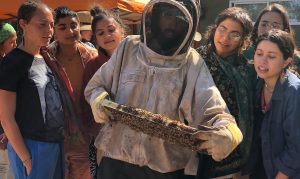 Soulflower Farm, a 2-acre organic-certified biodynamic permaculture farm in El Sobrante, CA, teaches herbal medicine and permaculture design. They received a $4,498 grant to establish a rainwater catchment system; improve their compost system; bring sheep and goats into their diversified farm to demonstrate a closed loop animal system; add ten beehives to add beekeeping to their BIPOC permaculture and beginning farmer trainings; and purchase 100 egg-laying chickens to use for integrated pest management in our fruit orchards and for sale of eggs.
Soulflower Farm, a 2-acre organic-certified biodynamic permaculture farm in El Sobrante, CA, teaches herbal medicine and permaculture design. They received a $4,498 grant to establish a rainwater catchment system; improve their compost system; bring sheep and goats into their diversified farm to demonstrate a closed loop animal system; add ten beehives to add beekeeping to their BIPOC permaculture and beginning farmer trainings; and purchase 100 egg-laying chickens to use for integrated pest management in our fruit orchards and for sale of eggs.
Soulflower Farm has made a lot of changes this year! They’ve ordered 50 chicks and added four sheep, a new sheep shelter, honeybee hives, and a rainwater catchment system to the farm. Maya Blow told us they already have over 5000 gallons of water stored in storage tanks! She also shared that the three female sheep will hopefully give birth this spring, and they plan to add additional beehives.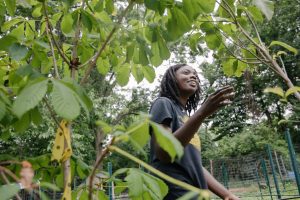
Philly Forests is a 3-acre farm in northwest Philadelphia, PA, that uses sustainable and regenerative growing practices to produce greens, peppers, tomatoes, allium, plums, strawberries, blackberries, and herbs. They operate a philanthropic Urban Ecology Program where they use a percentage of crop revenue to purchase trees, shrubs, and perennials to distribute for free to residents living in Philadelphia’s lowest canopy areas, generally lower-income, BIPOC-populated neighborhoods. They received a $2,800 grant to establish an irrigation system in their tree and native plant nursery instead of watering by hand.
The folks at Philly Forest successfully installed a nursery irrigation system! This system will help keep the trees healthy, reduce water waste, and reduce the labor needed to keep the trees watered. Executive Direct Jasmine M. Thompson told us, “the amount of trees that survive in the tree nursery is up from 70% to 95%!” Last year, they served about 4,000 public school students, 15 business owners, and 311 residents in their target zip codes with their tree program.
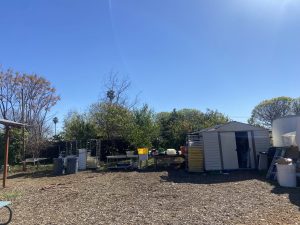 Huerta del Valle is a 10-acre agricultural nonprofit in Ontario, CA, that provides community farming plots and a CSA to distribute the fruits, vegetables, and herbs grown there if farmers choose to do so. Huerta del Valle has received a grant project extension to improve their produce processing and cleaning station. The new end date for completing their project is October 30, 2023. They’ll be sharing a final report at that time.
Huerta del Valle is a 10-acre agricultural nonprofit in Ontario, CA, that provides community farming plots and a CSA to distribute the fruits, vegetables, and herbs grown there if farmers choose to do so. Huerta del Valle has received a grant project extension to improve their produce processing and cleaning station. The new end date for completing their project is October 30, 2023. They’ll be sharing a final report at that time.
Cooperation Operation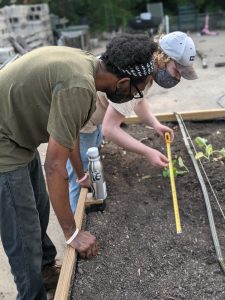 , a 2-acre agricultural nonprofit on the south side of Chicago, grows beans, squash, cucumbers, small fruits, peppers, tomatoes, okra, and herbs. The only farm in the area, their mission is to expand the local community’s access to practice sustainable agriculture in an urban context and consume locally-sourced produce. Cooperation Operation has also received a grant project extension. They will be making improvements to their wash/pack station by October 30, 2023 and sharing a final report at that time.
, a 2-acre agricultural nonprofit on the south side of Chicago, grows beans, squash, cucumbers, small fruits, peppers, tomatoes, okra, and herbs. The only farm in the area, their mission is to expand the local community’s access to practice sustainable agriculture in an urban context and consume locally-sourced produce. Cooperation Operation has also received a grant project extension. They will be making improvements to their wash/pack station by October 30, 2023 and sharing a final report at that time.
Ten Years of Small Grants with Big Impacts—
By the Numbers
- 105 farms supported
- $412,000 awarded
- 32 states represented
- 1,367 acres stewarded
- 86% Women & BIPOC Farmers
- 52% Family Farms
Please donate to support the 2023 grant cycle and help make a big impact on a small farm. 100% of your donation goes to the farms.
These grantees are stellar examples of how a little help can make an enormous impact. This season, the 2022 grantees have used their funding to make local food more available, improve pollinator habitats, conserve water, prevent erosion, educate the next generation of farmers, and more to better their communities. We’re thrilled to help small farms continue this incredible work in 2023. Stay tuned to meet the new grantees and join us in supporting small farms making big impacts.




